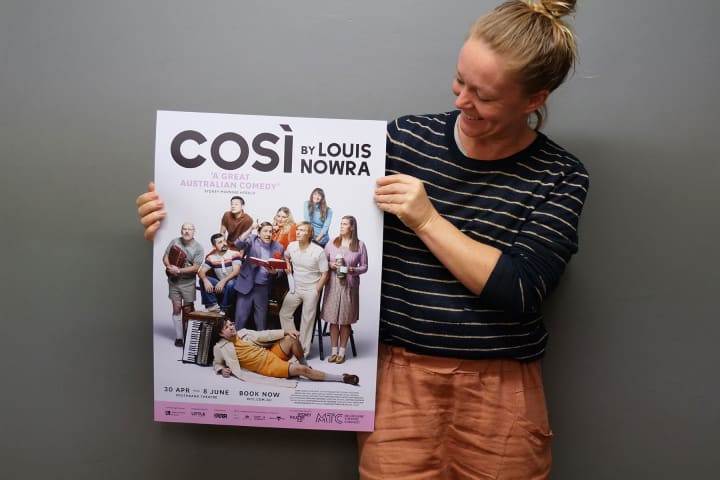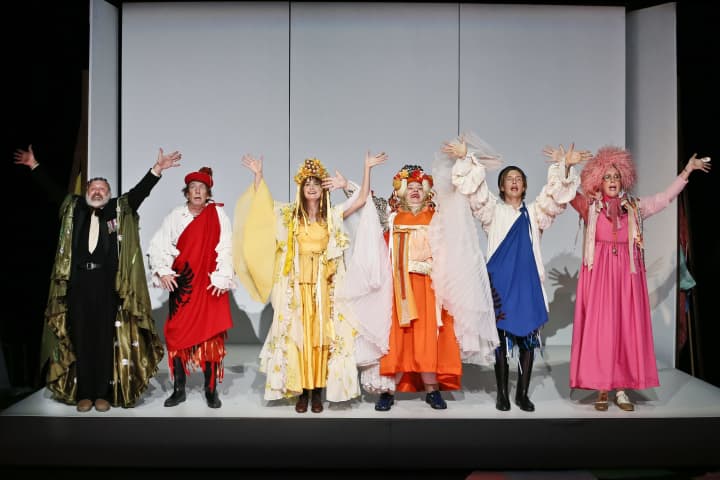What do you think the driving force behind your character Lewis is?
Investigation of madness. Lewis’s relationship to this is personal, his grandmother went mad, and somewhere inside him there’s a fear that this predisposition could manifest in him. Ostensibly, Lewis takes the job for the money, and to test himself as a director, but beneath this is a desire to explore what it means to be clinically mad, and how the resulting institutionalisation affects ones ability to interpret the world around them.
How do you inhabit your character? Do they have specific gestures, movements, facial expressions or habits?
Lewis is the audience's anchor in the somewhat abstracted world of the the asylum. He is surrounded by larger than life characters, some of whom have large barriers to overcome when it comes to human connection and interaction, others whom have a completely unfiltered approach to human connection. Lewis is a grounding force in this world and our link between these opposing ends of the human spectrum.
I found it was important to instill him with an air of patience, control and relaxation that juxtaposes the chaos surrounding him. He does snap, but only when he is pushed well beyond his ability to drive the activities at hand with language.
The performative aspect of direction was something I played with, there’s a clear-cut difference between Lewis in his moments of privacy and his moments in the theatre acting as he thinks a ‘director should’.
How does your character grow during the course of the play?
Lewis’s initial hubris upon entering the asylum – characterised by his lack of preparation and his judgements of the people and location – are a reflection of the views of his counterparts outside the theatre.
In the 1970s there was still great stigma around madness and mental health, and to be institutionalised was not only an indication of illness, but a rejection by society.
While his friends are exploring social ideologies that have basic human needs at their heart, it is hard for Lewis not to consider what he is doing as a fruitless and embarrassing exercise for a fresh graduate.
He is caught in the social ethos, while tackling a play with themes he finds trite, outdated and unimportant in the social climate.
But as the theatre slowly becomes a place of warmth and life, the patients his friends, and the play a realisation of the transformative power of performance, his personal judgements begin to make way for an appreciation of the triumph of human connection, and the capabilities of the unreliable mind.
Lewis realises that his friends' judgement of the downtrodden, institutionalised members of the asylum demonstrates a fundamental misunderstanding of human nature.
The wants and needs of the institutionalised have just as much worth as those outside the theatre, but their loss of agency, rejection by society and inability to be heard only exacerbates their existing conditions.
Lucy derides Lewis for being a romanticist, she and Nick are firm believers in reason over imagination, logic over emotion, science-making over institution.
But as Lewis grows, he embraces this side of his nature, rejoicing in what he and the patients have come together to create.
Can you describe a moment or exercise from rehearsal that helped you interpret and develop your character?
Our director Sarah Goodes was very open with me about the theatre directing experience, the anxieties, the joy, and the challenges a director faces in the day to day.
Her insights and honesty were a great inspiration when it came to directorial challenges of exploring something with the people that you're working with, while retaining the integrity of your vision. Also how hard won ideas must be continually fought for, while 'artistic concessions’ are a necessary part of the game, but not always for the better.
Also experimenting in character with fellow cast, leading them in ’theatre sports’, singing exercises and group direction was a useful indicator of the levels of energy and persistent patience required when relating to each specific character.
Trying to achieve a singular goal with a group of uncooperative minds, especially when each has their own dearly held vision of what is being created, is an incredible challenge and where the comedy of the piece springs from.
These excercises allowed me to play and experiment with the differing tactics suited to each individual personality and relationship in the theatre.
How important is experimentation and improvisation in rehearsal for you, in regards to interpreting the script and characters?
It played a wonderful part in our rehearsal, as the lines settled we would improvise as our characters; particularly when it came to Lewis’s relationship with Lucy, and his friendship with Nick. These established relationships in his life only have one or two establishing scenes in the play before they start to completely derail.
Exploring a shared history through improvisation was a fantastic way to build these relationships and explore the dynamic that exists between these three people, who live in the same house, who are seeing each other every night they get home from work.
Using improvisation to build our idea of the ‘real’ world outside our abstracted world of the theatre was a useful tool to add depth and complexity.
Do you have a favourite line from the script? It mightn’t be your own. Why is it your favourite?
“Couldn’t direct a nymphomaniac to a stag night.” I think all of my favourite lines spill out of Roy’s mouth, but this has to be one of his best.
Published on 20 April 2019





